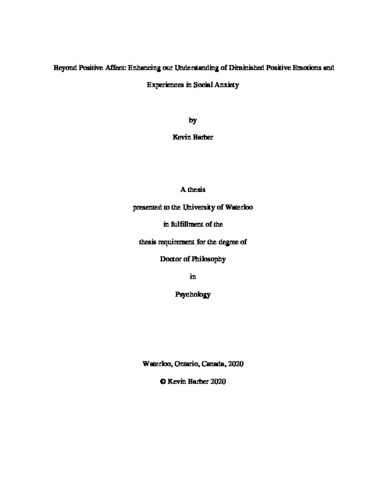| dc.description.abstract | Social anxiety disorder (SAD) has been found to be associated with decreased positive affect (PA) that is not attributable to depression or comorbidity with other disorders (e.g., Kashdan, 2007). Despite this, little is known about the biological, behavioural, cognitive and contextual variables implicated in diminished PA and positive experiences in SAD. The purpose of the current research was to advance our understanding of the psychological and contextual factors that contribute to and detract from the experience of positive emotions in social anxiety. Study one was designed to examine relations between motivational variables (affiliative social goals), cognitive factors (curiosity, authenticity, attentional focus), and positive emotional and interpersonal outcomes among high and low socially anxious participants within a dyadic modelling framework. Participants high and low in social anxiety completed a 45-minute semi-structured conversation with a low anxiety stranger, during which relevant predictor and outcome variables were measured repeatedly across time. Dyadic analyses using structural equation modelling revealed that participants’ affiliative social goals, curiosity, and authenticity, as well as partner social goals significantly contributed to participants’ experiences of positive emotions and interpersonal outcomes. Curiosity and authenticity were found to significantly mediate the relationship between affiliative social goals and interpersonal outcomes, with curiosity emerging as the sole mediator of the relationship between affiliative goals and PA. In addition, results illuminated key factors associated with positive outcomes for conversation partners. In study two, we coded the video recordings of the dyadic interactions in study one to examine the role of observable behavioural variables (empathy, warmth, emotional expressivity, reciprocity, and asking questions) on positive experiences, again within a dyadic framework. Results showed that reciprocity was of key importance in predicting positive experiences for both members of the dyad, emerging as a significant mediator of the relationship between affiliative goals and PA experienced by conversation partners, in addition to interpersonal outcomes for both members of the dyad. In study three, we sought to investigate the conditions under which positive affect deficits might emerge in response to standardized pleasant social and non-social stimuli in a clinical sample of individuals with SAD. Community participants diagnosed with SAD and healthy controls (HC) completed an online study where they were exposed to neutral (music and images) and positive (pleasant music, social imagery, non-social imagery) stimuli. Results demonstrated no differences between individuals with SAD and HCs in state PA, or PA reactivity when PA was measured as a global unitary construct based on the positive affect subscale of the Positive and Negative Affect Schedule. However, when PA was conceptualized and measured based on discrete subtypes of positive emotionality, global deficits emerged in relaxed and content PA for participants with SAD, suggesting that the operational definition and circumstances of measurement of positive emotions may be of key importance to understanding the nature of positivity deficits in social anxiety. The results of these studies are discussed within the context of theoretical models of positive emotions and social anxiety, with a focus on methodological strengths and limitations, future directions, and implications for enhancing our understanding and treatment of SAD. | en |

